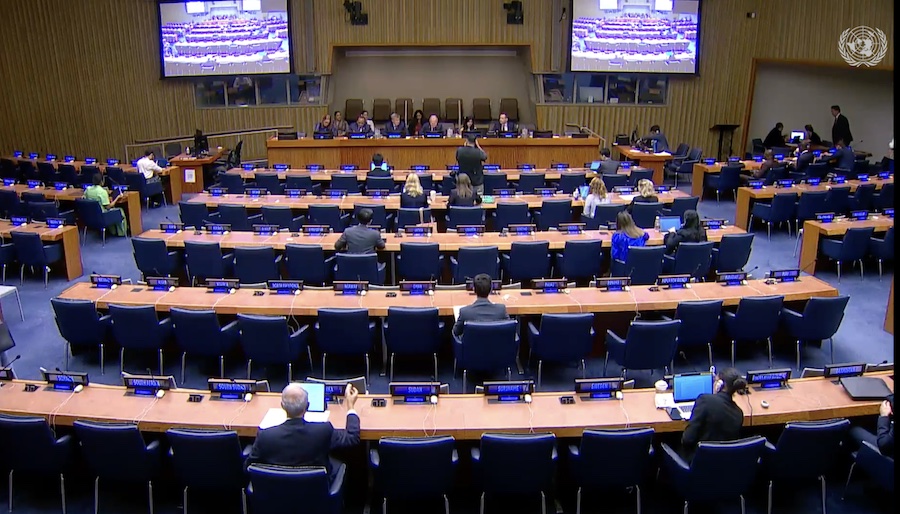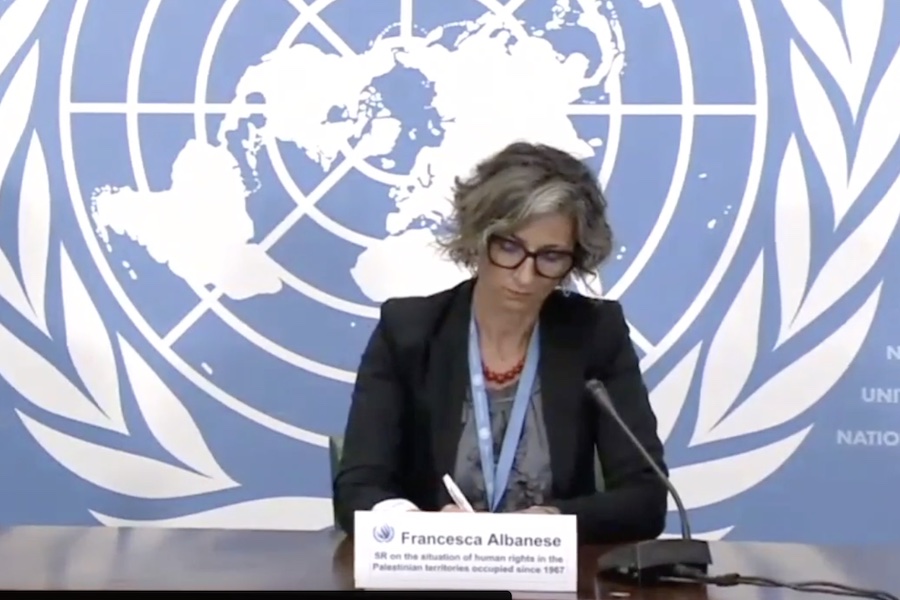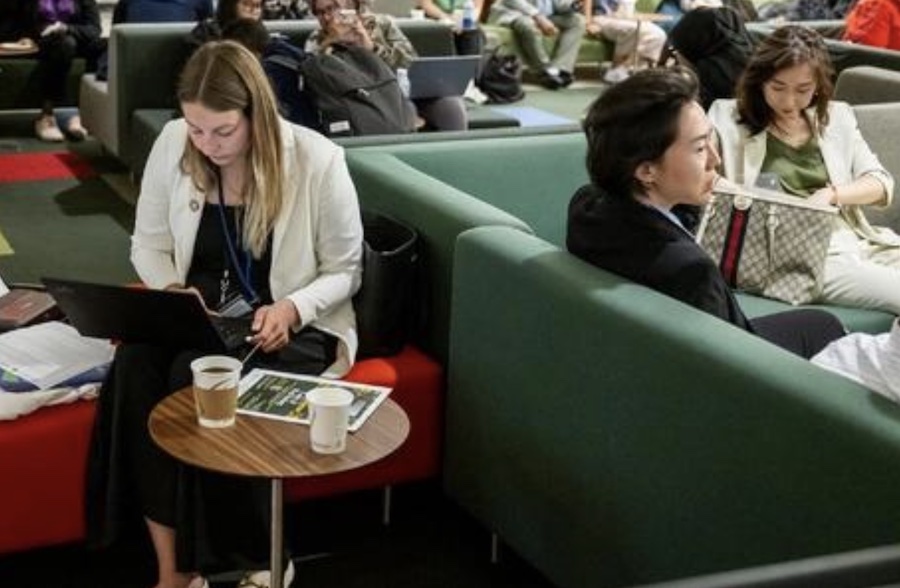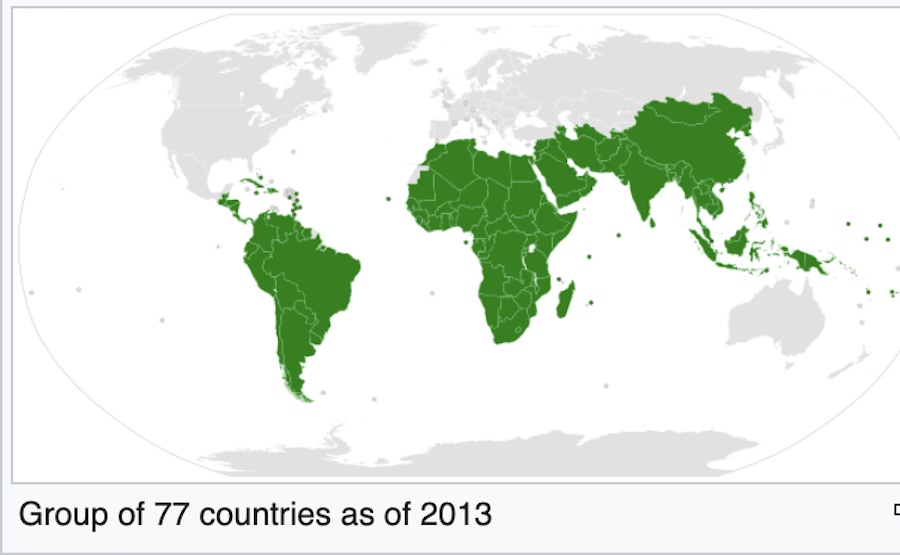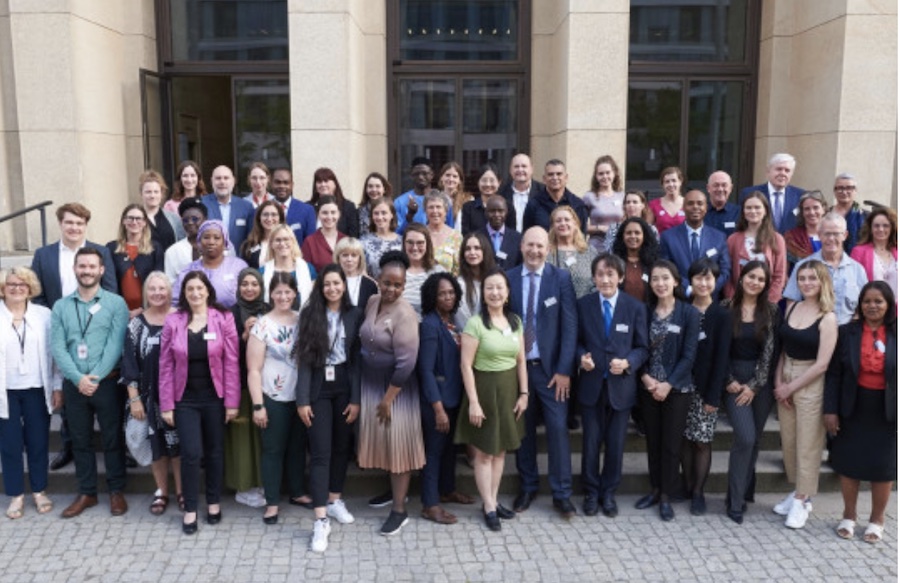. .DISARMAMENT & SECURITY. .
An article by Medea Benjamin and Nicolas J.S. Davies in Common Dreams ( reprinted according to Creative Commons CC BY-NC-ND 3.0)
As it did last year, the 2023 United Nations General Assembly has been debating what role the United Nations and its members should play in the crisis in Ukraine. The United States and its allies still insist that the UN Charter requires countries to take Ukraine’s side in the conflict, “for as long as it takes” to restore Ukraine’s pre-2014 internationally recognized borders.

They claim to be enforcing Article 2:4 of the UN Charter that states “All Members shall refrain in their international relations from the threat or use of force against the territorial integrity or political independence of any state, or in any other manner inconsistent with the Purposes of the United Nations.”
By their reasoning, Russia violated Article 2:4 by invading Ukraine, and that makes any compromise or negotiated settlement unconscionable, regardless of the consequences of prolonging the war.
Other countries have called for a peaceful diplomatic resolution of the conflict in Ukraine, based on the preceding article of the UN Charter, Article 2:3: “All Members shall settle their international disputes by peaceful means in such a manner that international peace and security, and justice, are not endangered.”
They also refer to the purposes of the UN, defined in Article 1:1, which include the “settlement of international disputes” by “peaceful means,” and they point to the dangers of escalation and nuclear war as an imperative for diplomacy to quickly end this war.
As the Amir of Qatar told the Assembly, “A long-term truce has become the most looked-for aspiration by people in Europe and all over the world. We call on all parties to comply with the UN Charter and international law and resort to a radical peaceful solution based on these principles.”
This year, the General Assembly has also been focused on other facets of a world in crisis: the failure to tackle the climate catastrophe; the lack of progress on the Sustainable Development Goals that countries agreed to in 2000; a neocolonial economic system that still divides the world into rich and poor; and the desperate need for structural reform of a UN Security Council that has failed in its basic responsibility to keep the peace and prevent war.
One speaker after another highlighted the persistent problems related to U.S. and Western abuses of power: the occupation of Palestine; cruel, illegal U.S. sanctions against Cuba and many other countries; Western exploitation of Africa that has evolved from slavery to debt servitude and neocolonialism; and a global financial system that exacerbates extreme inequalities of wealth and power across the world.
Brazil, by tradition, gives the first speech at the General Assembly, and President Lula da Silva spoke eloquently about the crises facing the UN and the world. On Ukraine, he said,
The war in Ukraine exposes our collective inability to enforce the purposes and principles of the UN Charter. We do not underestimate the difficulties in achieving peace. But no solution will be lasting if it is not based on dialogue. I have reiterated that work needs to be done to create space for negotiations… The UN was born to be the home of understanding and dialogue. The international community must choose. On one hand, there is the expansion of conflicts, the furthering of inequalities and the erosion of the rule of law. On the other, the renewing of multilateral institutions dedicated to promoting peace.
After a bumbling, incoherent speech by President Biden, Latin America again took the stage in the person of President Gustavo Petro of Colombia:
While the minutes that define life or death on our planet are ticking on, rather than halting this march of time and talking about how to defend life for the future, thanks to deepening knowledge, expand it to the universe, we decided to waste time killing each other. We are not thinking about how to expand life to the stars, but rather how to end life on our own planet. We have devoted ourselves to war. We have been called to war. Latin America has been called upon to produce war machines, men, to go to the killing fields.
(Continued in right column)
Can the culture of peace be established at the level of the state?
(Continued from left column)
They’re forgetting that our countries have been invaded several times by the very same people who are now talking about combatting invasions. They’re forgetting that they invaded Iraq, Syria and Libya for oil. They’re forgetting that the same reasons they use to defend Zelenskyy are the very reasons that should be used to defend Palestine. They forget that to meet the Sustainable Development Goals, we must end all wars.
But they’re helping to wage one war in particular, because world powers see this suiting themselves in their game of thrones, in their hunger games and they’re forgetting to bring an end to the other war because, for these powers, this did not suit them. What is the difference between Ukraine and Palestine, I ask? Is it not time to bring an end to both wars, and other wars too, and make the most of the short time we have to build paths to save life on the planet?
…I propose that the United Nations, as soon as possible, should hold two peace conferences, one on Ukraine, the other on Palestine, not because there are no other wars in the world—there are in my country—but because this would guide the way to making peace in all regions of the planet, because both of these, by themselves, could bring an end to hypocrisy as a political practice, because we could be sincere, a virtue without which we cannot be warriors for life itself.
Petro was not the only leader who upheld the value of sincerity and assailed the hypocrisy of Western diplomacy. Prime Minister Ralph Gonsalves of St. Vincent and the Grenadines cut to the chase:
Let us clear certain ideational cobwebs from our brains. It is, for example, wholly unhelpful to frame the central contradictions of our troubled times as revolving around a struggle between democracies and autocracies. St. Vincent and the Grenadines, a strong liberal democracy, rejects this wrong-headed thesis. It is evident to all right-thinking persons, devoid of self-serving hypocrisy, that the struggle today between the dominant powers is centered upon the control, ownership, and distribution of the world’s resources.
On the war in Ukraine, Gonsalves was equally blunt. “…War and conflict rage senselessly across the globe; in at least one case, Ukraine, the principal adversaries — the North Atlantic Treaty Organisation (NATO) and Russia — may unwittingly open the gates to a nuclear Armageddon… Russia, NATO, and Ukraine should embrace peace, not war and conflict, even if peace has to rest upon a mutually agreed, settled condition of dissatisfaction.”
The Western position on Ukraine was also on full display. However, at least three NATO members (Bulgaria, Hungary and Spain) coupled their denunciations of Russian aggression with pleas for peace. Katalin Novak, the President of Hungary, said,
…We want peace, in our country, in Ukraine, in Europe, in the world. Peace and the security that comes with it. There is no alternative to peace. The killing, the terrible destruction, must stop as soon as possible. War is never the solution. We know that peace is only realistically attainable when at least one side sees the time for negotiations as having come. We cannot decide for Ukrainians about how much they are prepared to sacrifice, but we have a duty to represent our own nation’s desire for peace. And we must do all we can to avoid an escalation of the war.
Even with wars, drought, debt and poverty afflicting their own continent, at least 17 African leaders took time during their General Assembly speeches to call for peace in Ukraine. Some voiced their support for the African Peace Initiative, while others contrasted the West’s commitments and expenditures for the war in Ukraine with its endemic neglect of Africa’s problems. President Joao Lourenço of Angola clearly explained why, as Africa rises up to reject neocolonialism and build its own future, peace in Ukraine remains a vital interest for Africa and people everywhere:
In Europe, the war between Russia and Ukraine deserves our full attention to the urgent need to put an immediate end to it, given the levels of human and material destruction there, the risk of an escalation into a major conflict on a global scale and the impact of its harmful effects on energy and food security. All the evidence tells us that it is unlikely that there will be winners and losers on the battlefield, which is why the parties involved should be encouraged to prioritize dialogue and diplomacy as soon as possible, to establish a ceasefire and to negotiate a lasting peace not only for the warring countries, but which will guarantee Europe’s security and contribute to world peace and security.
Altogether, leaders from at least 50 countries spoke up for peace in Ukraine at the 2023 UN General Assembly. In his closing statement, Dennis Francis, the Trinidadian president of this year’s UN General Assembly, noted,
Of the topics raised during the High-Level Week, few were as frequent, consistent, or as charged as that of the Ukraine War. The international community is clear that political independence, sovereignty, and territorial integrity must be respected, and violence must end.
You can find all 50 statements at this link on the: CODEPINK website
